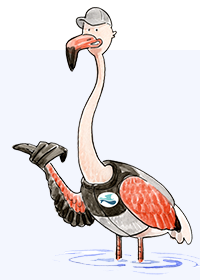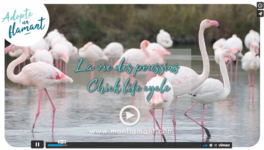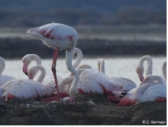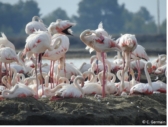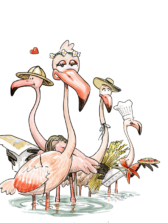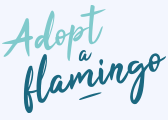|
Greater Flamingo news from around the Mediterranean ͏ ͏ ͏ ͏ ͏ ͏ ͏ ͏ ͏ ͏ ͏ ͏ ͏ ͏ ͏ ͏ ͏ ͏ ͏ ͏ ͏ ͏ ͏ ͏ ͏ ͏ ͏ ͏ ͏ ͏ ͏ ͏ ͏ ͏ ͏ ͏ ͏ ͏ ͏ ͏ ͏ ͏ ͏ ͏ ͏ ͏ ͏ ͏ ͏ ͏ ͏ ͏ ͏ ͏ ͏ ͏ ͏ ͏ ͏ ͏ ͏ ͏ ͏ ͏ ͏ ͏ ͏ ͏ ͏ ͏ ͏ ͏ ͏ ͏ ͏ ͏ ͏ ͏ ͏ ͏ ͏ ͏ ͏ ͏ ͏ ͏ ͏ ͏ ͏ ͏ ͏ ͏ ͏ ͏ ͏ ͏ ͏ ͏ ͏ ͏ ͏ ͏ ͏ ͏ ͏ ͏ ͏ ͏ ͏ ͏ ͏ ͏ ͏ ͏ ͏ ͏ ͏ ͏ ͏ ͏ ͏ ͏ ͏ ͏ ͏ ͏ ͏ ͏ ͏ ͏ ͏ ͏ ͏ ͏ ͏ ͏ ͏ ͏ ͏ ͏ ͏ ͏ ͏ ͏ ͏ ͏ ͏ ͏ ͏ ͏ ͏ ͏ ͏ ͏ ͏ ͏ ͏ ͏ ͏ ͏ ͏ ͏ ͏ ͏ ͏ ͏ ͏ ͏ ͏ ͏ ͏ ͏ ͏ ͏ ͏ ͏ ͏ ͏ ͏ ͏ ͏ ͏ ͏ ͏ ͏ ͏ ͏ ͏ ͏ ͏ ͏ ͏ ͏ ͏ ͏ ͏ ͏ ͏ ͏ ͏ ͏ ͏ ͏ ͏ ͏ ͏ ͏ ͏ ͏ ͏ ͏ ͏ ͏ ͏ ͏ ͏ ͏ ͏ ͏ ͏ ͏ ͏ ͏ ͏ ͏ ͏ ͏ ͏ ͏ ͏ ͏ ͏ ͏ ͏ ͏ ͏ ͏ ͏ ͏ ͏ ͏ ͏ ͏ ͏ ͏ ͏ ͏ ͏ ͏
If this message is displayed incorrectly, you can consult the online version. |
|
| |
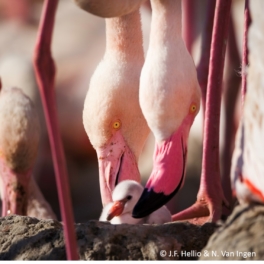 | |
The month of June is the transition from spring to summer, temperatures rise (as well as the number of mosquitoes but that’s another story…) and it is the time for the release of our latest Gazette. But not only! It is also a wonderful time for our friends the flamingos with the birth of new chicks ❤️. After a month spent all cosy in their egg, incubated by both parents, they finally emerge to everyone’s great delight!
Flamingolly yours,
|
|
|
|
|
| |
What are the flamingos up to right now?
|
|
|
|
| |
What was bournd to happen... happened!
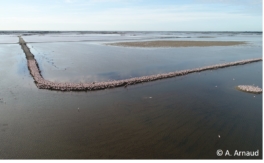 | |
After long weeks of looking their best and dancing, dancing like nobody was watching, it is finally time for the flamingos to settle down comfortably on an islet to lay their eggs and nest over them. They snubbed the Fangassier isle and they nest once again at Aigues-Mortes. They did not arrive early, probably put off by a particularly dry winter and spring. Nevertheless, they still decided to settle down in early May in the Étang du Roi, on an islet and on a dike (see photo above 18/05/2021). Our team has been closely following for several weeks the installation of the colony and its evolution: the first eggs, the first hatchings, the first disturbances… with dozens and dozens of observation hours on the clock! We can only keep our fingers crossed that this continues and hope to have a great ringing session in the middle of summer!
|
|
|
|
|
| |
Gimme your science!
Sex equality and sharing responsibilities!
During incubation, the parents take turns every 3-4 days to incubate the single egg laid. The male flamingo has, like the female, a brood patch. It is an area of ventral skin that loses its feathers at the time of nesting. The capillary blood network is then activated. When in contact with this zone the egg benefits from the parental heat necessary for the development of the embryo. |
|
|
|
| |
Age is just a number!
FFA is a female flamingo currently observed at the colony and confirmed as a breeder! She was born in 1979 and will soon celebrate her 42nd birthday. Since her birth she has been observed multiple times, often as a breeder, in France and in Spain. Could FFA be related to Nora, our lovey-dovey grandmother?
|
|
|
|
|
|
| |
Euro 2021 Colony
Among the many observed flamingos in the colony currently settled at the Salin d’Aigues-Mortes, FVDL, a French male flamingo born in 2006 is next to IDHL in this photo, an Italian male flamingo born in 2004. The latter seems to be the proud father of a chick that was born between the 2nd and 4th of June. IDHL is not the only Italian present this year… More than 90 Italians rings have been read on this site so far. Let us hope that the future football results will not disturb the good relations in the colony…
|
|
|
|
|
|
| |
The flamingos have itchy feet!
What do Pat, Popit, Barnabé, Cupidon, Antonin, Aphrodite, Dora, Roméo, Marco and more than 207 ideal flamingos have in common? They were all observed these last few weeks! Among the 207 ideal flamingos, 131 were seen at the colony of Aigues-Mortes. If you are one of the happy sponsors of these charming flamingos you will have received one or more alerts by email. For the others you will have to be a little more patient. We are sure that other flamingos will show up, unless they have found themselves a nice little wetland hidden away from prying eyes…
|
|
|
|
|
|
| |
Gimme your science!
The flamingo day care experience!
About 10 days after hatching, the chick quickly gains in confidence and joins the other youngsters of his age, forming what we call a nursery. The parents can finally regain their strength and will only return to feed their chick during the cooler hours, when night begins to fall. There will often be a few adults that stay with the chicks during the day.
No these flamingos are not nannies! But rather flamingos who have lost their egg due to predation by gulls, drowning after heavy rains or by accident if the egg rolled out of the nest, and thus they have begun their moult and are unable to fly! |
|
|
|
| |
There is a flamingo network that exists in the Mediterranean and West Africa
The Tour du Valat has been leading the network for the study and conservation of flamingos in the Mediterranean and West Africa since 2002. We rely on broad-based partnerships located in 13 countries. Each year we collect information on flamingo reproduction within the network in order to better understand the dynamics of the species and inter-annual variations in breeding success. The great strength of this network is the sharing of all the information regarding ringings and reading of rings within a single database.
|
|
|
|
| |
Unusual
- Bob, a real mascot!
Bob is a Caribbean flamingo who was treated in a sanctuary on the island of Curacao in the Dutch Caribbean for a concussion after throwing himself through a hotel window. Also suffering from clubfoot, he can no longer use his feet to find food. His chances of survival in the wild being low, the staff at the sanctuary thought it safer to keep him and use him to convey beautiful messages about the rich fauna of the island. For more information
|
|
|
|
| |
How about the network?
|
|
|
|
| |
Alice and Capucine, young committed sponsors
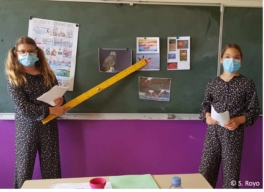 | |
Since Christmas Alice and Capucine, two 11 year old girls, are the happy sponsors of Anaïs and Barnabé. By using the documents they received for their contribution, they made a presentation on the Greater Flamingos and presented it to their Year 6 classmates in Sommières. They had great success after they explained the concept of creches with the youngsters being watched over by all the parents! At the end of their presentation they even recommended their classmates to also sponsor a flamingo. A big thank you from us to these two wonderful kind-hearted ambassadors!
|
|
|
|
|
| |
A flamingo in the scrum!
Esprit Sud Sevens is a committed and responsible rugby club from Occitania! Since the creation of their association 10 years ago their mascot has been a Greater Flamingo named Nossa. As a tribute to their mascot the club decided to sponsor a flamingo of the same name, a male flamingo born in 2006 who wears the FZLJ ring. A big thank you to the ES7 for their support!
|
|
|
|
|
|
| |
Gimme another Gazette!
This Gazette has come to an end, but if you want to know more, you can read all our previous Gazettes!
And if you have any ideas for the next one or any comments, please contact us below!
|
|
|
|
|
|

